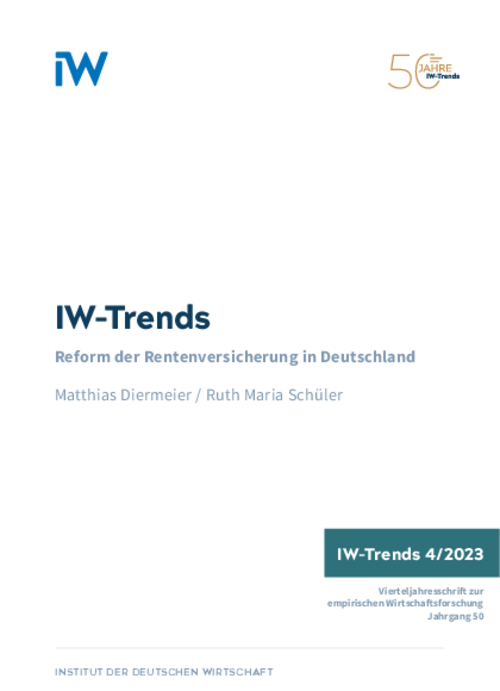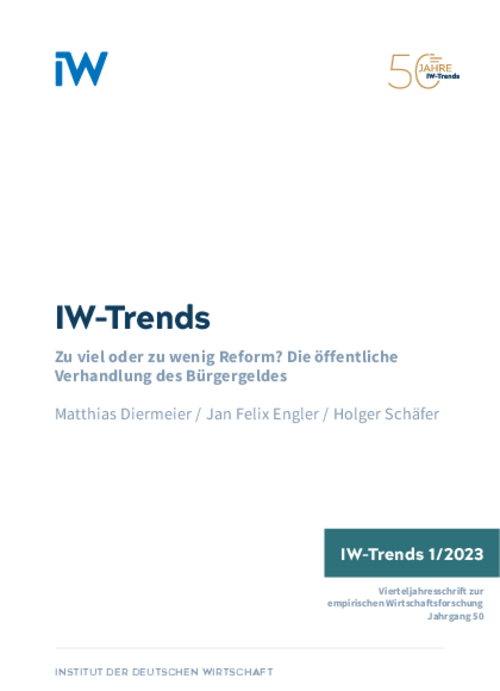Please switch to a modern browser (e.g. Google Chrome, Firefox or Microsoft Edge) in order to enjoy the best user experience.

Managing Director of IW Gesellschaftsforschung gGmbH and Head of Research Unit Democracy, Society, Market Economy
Tel: +49 221 4981-605 Mail: diermeier@iwkoeln.de Matthias DiermeierResearch groups
Diermeier, Matthias / Niehues, Judith / Sultan, Samina, 2024, Europa wählt: Wen interessiert’s und warum? Einstellungen der Deutschen zur EU-Wahl und Europapolitik, IW-Report, Nr. 29, Köln
Zur Studie
Diermeier, Matthias / Schüler, Ruth Maria, 2023, Reform der Rentenversicherung in Deutschland. Eine Empirie zu Reformaversionen, in: IW-Trends, 50. Jg., Nr. 4, S. 45-60
Zur Studie
Diermeier, Matthias / Engler, Jan Felix / Schäfer, Holger, 2023, Zu viel oder zu wenig Reform?. Die öffentliche Verhandlung des Bürgergeldes, in: IW-Trends, 50. Jg., Nr. 1, S. 101-124
Zur Studie
Schüler, Ruth Maria / Diermeier, Matthias, 2023, Aufstieg und Fall von Industriestädten dies- und jenseits des Atlantiks, IW-Kurzbericht, Nr. 16, Köln
Zur Studie
Diermeier, Matthias / Niehues, Judith, 2021, Demokratische Resilienz in Deutschland?. Parlamentarische Verfahrensakzeptanz im Licht individueller Problemwahrnehmung, in: IW-Trends, 48. Jg., Nr. 3, S. 89-112
Zur Studie
Diermeier, Matthias / Hüther, Michael / Obst, Thomas, 2021, Wunsch und Wirklichkeit: Kaum Ausgabenspielräume in der neuen Legislaturperiode. Zwischen Schuldenbremse und Steuererhöhungen, IW-Report, Nr. 33, Köln / Berlin
Zur Studie
Bardt, Hubertus / Diermeier, Matthias / Grömling, Michael / Hüther, Michael / Obst, Thomas, 2021, Lieferengpässe und Preisentwicklungen bei Rohstoffen und Vorleistungen. Corona Echo Effekte oder ‚here to stay’?, IW-Report, Nr. 27, Köln / Berlin
Zur Studie
(in cooperation with Judith Niehues)
Einschätzungen zur Arbeitslosigkeit – Unwissen befördert systemisches Misstrauen
IW-Trends 2/2019
(in cooperation with Knut Bergmann, Judith Niehues)
AfD-Ergebnis nicht allein durch abgehängte Regionen erklärbar
IW-Kurzbericht 36/2018
(in cooperation with Michael Hüther, Markos Jung)
It’s business models, stupid!
IW-Kurzbericht 33/2018
(in cooperation with Markus Demary, Michael Hüther, Markos Jung, Jürgen Matthes)
Schriftliche Stellungnahme zu einer öffentlichen Anhörung des Bundestagsausschuss für die Angelegenheiten der Europäischen Union
IW-Report 20/2018
(in cooperation with Markos Jung, Pekka Sagner)
Wirtschaftskrise bremst europäische Konvergenz
IW-Kurzbericht 30/2018
(in cooperation with Henry Goecke, Judith Niehues, Tobias Thomas)
Verzerrte Wahrnehmung: Wie Berichte über Ungleichheit verunsichern
IW-Kurzbericht 63/2017
(in cooperation with Knut Bergmann, Judith Niehues)
NRW-Wahl – Nur wenige AfD-Wähler arbeitslos
IW-Kurzbericht 51/2017
(in cooperation with Knut Bergmann)
Die AfD: Eine unterschätzte Partei – Soziale Erwünschtheit als Erklärung für fehlerhafte Prognosen
IW-Report 7/2017
(in cooperation with Henry Goecke)
Geldmenge und Inflation in Europa – Ist der Zusammenhang verloren?
IW policy papers 17/2016
Brexit – Hohe Unsicherheit, panische Stimmung und zuversichtliche Märkte
IW-Kurzbericht 64/2016
Iran – Economic revolution or recession?
IW-Kurzbericht 39/2016
(in cooperation with Knut Bergmann, Judith Niehues)
Parteipräferenz und Einkommen – Die AfD, eine Partei der Besserverdiener?
IW-Kurzbericht 19/2016
(in cooperation with Vera Demary)
Fusionen und Übernahmen in der deutschen Industrie – Auf dem Weg zur Industrie 4.0?
IW-Trends 4/2015
(in cooperation with Forschungsgruppe Konjunktur)
Moderate Schlagzahl im Fahrwasser der schwächeren Weltwirtschaft – IW-Konjunkturprognose Herbst 2015
IW-Trends 4/2015
(in cooperation with Forschungsgruppe Konjunktur)
Neue Herausforderungen – Konjunkturelle Fragen im Herbst 2015
Fragen und Antworten, 2015
(in cooperation with Markus Demary, Heide Haas)
Die Europäische Kapitalmarktunion – Zur Relevanz von Banken und Märkten
IW policy papers 18/2015
(in cooperation with Markus Demary, Vera Demary, Heide Haas, Tobias Hentze, Jochen Pimpertz, Klaus-Heiner Röhl)
Building a Capital Markets Union – Comments on the Public consultation
EU Commission Green Paper
Bergmann, Knut / Diermeier, Matthias / Kinderman, Daniel / Schroeder, Wolfgang, 2024, Die deutsche Wirtschaft und die AfD. Erfahrungen, Befunde und erste Forschungsergebnisse, in: Wissenschafszentrum Berlin für Sozialforschung (Hrsg.), Discussion Paper //2024-602, Berlin / Köln
Zur Studie
Diermeier, Matthias / Niehues, Judith, 2023, Punching up or Punching down?. How Stereotyping the Rich and the Poor Impacts Redistributive Preferences in Germany, in: SOEP papers, No. 1182, 36 Seiten
Zur Studie
Diermeier, Matthias, 2021, Tailoring the Truth. An experimental approach to parliamentarians’ toleration of misinformation and responsiveness in Germany, in: Regierungsforschung.de, Wissenschaftliches Online-Magazin der NRW School of Governance, Duisburg
Zur Studie
Hüther, Michael / Diermeier, Matthias, 2022, Globalisation under pressure?. How current megatrends shape the patters of international trade, capital flows and technology diffusion, in: Ernest Gnan/Christoph Schneider/Claudia Stowasser (Hg.) Schwerpunkt Außenwirtschaft 2021/2022, Reglobalisation: Changing Patterns, S. 137-14
zum Beitrag
Diermeier, Matthias / Niehues, Judith, 2022, Towards a nuanced understanding of anti-immigration sentiment in the welfare state. a program specific analysis of welfare preferences, in: Rationality and Society, Seite 1-33
Zur Studie
(in cooperation with Michael Hüther)
Globalisierung im Systemwettbewerb - Eruopäische Integration, transatlantische Werte, chinesischer Weg
Europa: In Vielfalt geeint!, 30 Perspektiven zur Rettung Europas vor sich selbst, Gregor Kirchhof, Mario Keller, Reiner Schmidt (Hrsg.), in Kooperation mit der Münchner Europakonferenz, Verlag C.H. Beck oHG, München, 2020, S. 299-318
(in cooperation with Michael Hüther)
Ökonomische Ungleichheit als Demokratieproblem
Die repräsentative Demokratie in Anfechtung und Bewährung, Volker Kronenberg und Jakob Horneber (Hrsg.), Springer VS, Wiesbaden, 2019, S. 39-52
(in cooperation with Michael Hüther)
Perception and Reality: Economic Inequality as a Driver of Populism?,
in Analyse und Kritik: Journal for Philisophy and Social Theory, 2019, Vol 41. No. 2, pp. 337-357
(in cooperation with Andrew Bassilakis, Henry Goecke)
Converging Media versus Diverging Politics - the Brexit Twitter on Debate
CESifo Forum 19, Heft 4, 2018, S. 23–28
(in cooperation with Henry Goecke, Michael Hüther)
Exhausted Globalisation – Between the Transatlantic Orientation and the Chinese Way
Cambridge Scholar Publishing, Newcastly upon Tyne, 2018
(in cooperation with Henry Goecke, Michael Hüther)
Die erschöpfte Globalisierung – Zwischen transatlantischer Orientierung und chinesischem Weg
Springer Nature, Wiesbaden, 2018
(in cooperation with Michael Hüther, Markos Jung, Andrew Bassilakis)
If Nothing is Achieved – Who Pays for the Brexit?
ZBW, Intereconomics, Vol. 53, No. 5, 2018, pp. 274–280
(in cooperation with Knut Bergmann, Judith Niehues)
Ein komplexes Gebilde. Eine sozio-ökonomische Analyse des Ergebnisses der AfD bei der Bundestagswahl 2017
ZParl Zeitschrift für Parlamentsfragen, 49. Jg, Heft 2, 2018, S. 243–264
(in cooperation with Henry Goecke, Judith Niehues, Tobias Thomas)
Impact of Inequality-Related Media Coverage on the Concerns of German Citizens
Düsseldorf Institute for Competition Economics, Discussion Paper, No. 258, pp. 2–35
(in cooperation with Markus Demary)
A European "Bad Bank": A Crisis Management Tool, but not a Substitute for Structural Reforms
FAES Papers, No. 204, Madrid, 2017
(in cooperation with Henry Goecke)
Productivity, Technology Diffusion and Digitization
CESifo Forum , Vol. 18, Heft 1, 2017, 26–32
(in cooperation with Knut Bergmann, Judith Niehues)
Allzeit fern des Durchschnitts: Politische Ansichten der AfD-Anhänger
Forschungsjournal Soziale Bewegungen, 30. Jg., Heft 2, 2017, Seite 12–25
(in cooperation with Henry Goecke, Adriana Neligan)
Rohstoffbezug deutscher Unternehmen in globalen Wertschöpfungsketten
Wirtschaftsdienst, 97. Jg., Heft 7, S. 499–505
(in cooperation with Knut Bergmann, Judith Niehues)
Die AfD: Eine Partei der sich ausgeliefert fühlenden Durchschnitts-verdiener?
ZParl Zeitschrift für Parlamentsfragen, 48. Jg, Heft 1, 2017, S. 57–75
(in cooperation with Berthold Busch, Henry Goecke, Michael Hüther)
Brexit und die Zukunft Europas – eine spieltheoretische Einordnung
Wirtschaftsdienst, 96. Jg., Heft 12, S. 883–890
(in cooperation with Henry Goecke, Michael Hüther)
Ökonomische Perspektiven der digitalen Transformation – Zwischen Produktivitätsrätsel und Wachstumshoffnung
Cologne Center for Ethics, Rights, Economics, and Social Sciences, i. E.
(in cooperation with Michael Hüther)
Mit dem großen Hebel für mehr Investitionen: ökonomische Bewertung des Juncker Plans
Wirtschaftsdienst, 95. Jg., Heft 5, 2015, S. 334–341
(in cooperation with Torsten Schmidt)
Oil Price Implications on Land Use Change
Agricultural Economics Review (forthcoming), 2014
(in cooperation with Martin Eiglsperger)
Treatment of Seasonal Items Related Structural Breaks in the HICP
presented at the conferences: Messung der Preise in Trier 2012 and at the Ottawa-Group Meeting in Kopenhagen 2013
(in cooperation with Yngve Abrahamsen)
The Construction Market in Switzerland
Country Report, All Country Reports of 72st Euroconstruct Conference, Paris, 2011

This study, based on the IW-People Survey 2024, shows that around 62% of Germans consider the election of the European Parliament to be important. This is the result of around 5,200 respondents. The proportion is therefore roughly as high as the voter turnout in 2019.
IW
The Alternative for Germany (AfD) has established itself in Germany as a liberal-right-wing populist party in terms of its economic policy programme.
IW

The demographic transition is putting the German statutory pension insurance system under enormous pressure to reform. Despite widespread concern, no reform of the adjustment mechanisms incorporated into the pension system meets with the approval of a majority of the population.
IW

Under its new name, Citizens' Benefit (Bürgergeld), Germany’s reformed unemployment benefit was supposed to put basic benefits for job-seekers on a new footing and fulfil the political promise to "overcome" its controversial predecessor known, after its original sponsor’s final proposal, as ‘Hartz IV’.
IW
Redistribution and the welfare state have been linked by academic discourse to narratives that portray specific societal groups as ‘deserving’ or ‘undeserving’. The present analysis contributes to this scholarship in a twofold manner.
IW
Buffalo (New York) and Dortmund (North Rhine Westphalia) as well as Akron (Ohio) and Chemnitz (Saxony) are twin cities that share the history of deindustrialization. At the same time, they experienced rapid population growth and a globalization shock in the middle and end (East Germany) of the twentieth century. The structural change in the Rust Belt was accompanied by economic upheavals, which is still reflected in today’s reluctance for electoral participation. In this respect, social security and regional policy have had a stabilizing effect in Germany.
IW
The rise of populist radical right parties (PRRPs) is largely seen to have been triggered by a dealignment between voters and political elites and to have triggered an increasing supply of misinformation.
IW

Deglobalisation, digitalisation, decarbonisation, and demographic change have already left their mark on the global economy. In the future the multiple transformations that the international patterns of specialisation undergo are likely to accelerate as the four megatrends mature and unfold their true disruptive potential.
IW

Previous studies have found substantial support across Europe for the creation of a universal basic income system. Yet as Matthias Diermeier and Judith Niehues explain, there is also widespread support for restricting the access of immigrants to state benefits. Drawing on new research, they assess how these two perspectives shape wider attitudes toward welfare.
IW
The literature on immigration and the welfare state describes a trade-off between immigration and welfare support. We argue for a more nuanced view of welfare chauvinism that accounts for different motivational channels, specific welfare programs and particular population subgroups.
IW